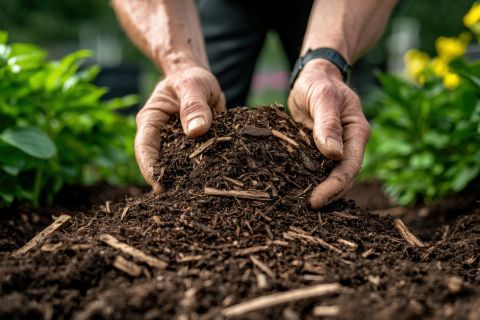
Mulching is one of the simplest yet most effective gardening practices you can adopt. By adding a layer of organic or inorganic material to the surface of your garden beds, you create a protective barrier that offers numerous benefits for both your soil and your plants. Whether you’re a seasoned gardener or just getting started, mulching every year as a part of your routine can help improve the health and vitality of your garden.
Let’s explore the benefits of mulching yearly, the different types of mulch available, and tips for applying mulch effectively to maximize its positive impact.
1. Mulching Helps Retain Soil Moisture
One of the biggest benefits of mulching yearly is its ability to conserve water. A thick layer of mulch acts as a barrier that reduces evaporation from the soil, keeping the moisture where it’s needed most—at the roots of your plants. This is especially important during the hot summer months when water loss due to evaporation can be significant.
- Reduces the need for frequent watering: By retaining moisture, mulching minimizes the amount of time and effort you need to spend watering your garden, which is not only convenient but also eco-friendly. In dry or drought-prone regions, mulching can make a significant difference in conserving water resources.
- Helps plants survive during dry spells: Premium mulch creates a more stable, hydrated environment for your plants, making them more resilient during periods of low rainfall or hot weather. This ensures that your plants stay healthy and productive even when water availability is limited.
2. Mulch Suppresses Weeds
Few things frustrate gardeners more than the constant battle with weeds. Mulching is an excellent natural way to reduce weed growth without the use of chemical herbicides. By covering the soil, mulch blocks sunlight from reaching weed seeds, preventing them from germinating and growing.
- Reduces competition for nutrients: Weeds can steal valuable nutrients from your plants, especially in nutrient-poor soils. Mulching prevents weeds from taking root, allowing your plants to access more of the soil’s available nutrients.
- Minimizes the need for weeding: With fewer weeds to pull, you’ll spend less time on garden maintenance and more time enjoying your beautiful plants. Plus, the few weeds that do manage to break through the mulch layer will be much easier to remove.
3. Mulching Improves Soil Health and Fertility
Mulching with organic materials, such as leaves, straw, grass clippings, or compost, offers a significant benefit to your garden’s soil over time. As organic mulch breaks down, it decomposes into nutrient-rich matter that naturally enhances soil fertility.
- Adds valuable nutrients: Organic mulch acts as a slow-release fertilizer, providing essential nutrients like nitrogen, phosphorus, and potassium to the soil as it breaks down. This nutrient boost improves plant growth and increases the productivity of your garden.
- Encourages beneficial soil organisms: A healthy garden depends on a thriving ecosystem of microorganisms, earthworms, and insects that help break down organic matter and enrich the soil. Mulch creates an ideal environment for these organisms by keeping the soil moist, cool, and protected from harsh weather conditions. Their activity improves soil structure, aeration, and nutrient cycling, which ultimately benefits your plants.
4. Mulch Regulates Soil Temperature
Mulching every year acts as an insulating blanket for your garden, helping to regulate soil temperature throughout the year. This creates a more stable environment for plant roots and encourages better growth, especially for temperature-sensitive plants.
- Keeps soil cooler in the summer: During the hot summer months, mulch helps keep the soil cool by blocking the sun’s rays and reducing heat buildup. This is particularly beneficial for plants with shallow root systems, which are more vulnerable to temperature fluctuations.
- Prevents frost damage in winter: In colder months, mulch provides an insulating layer that helps protect plant roots from freezing temperatures. It also prevents the soil from freezing and thawing repeatedly, which can damage roots and disturb the structure of the soil.
5. Mulch Reduces Soil Erosion
Soil erosion occurs when wind, rain, or irrigation water washes away the top layer of soil, which contains the majority of the nutrients that plants rely on. Mulching helps prevent this by stabilizing the soil and absorbing the impact of raindrops, reducing runoff and erosion.
- Keeps valuable topsoil in place: By protecting the surface of the soil from being blown or washed away, mulch helps maintain the structure and integrity of your garden beds. This is especially important on sloped areas or in regions with heavy rainfall, where soil erosion can be a significant problem.
- Prevents nutrient leaching: Mulch helps keep nutrients in the soil by reducing runoff during heavy rains. This ensures that the nutrients your plants need remain available to them, rather than being washed away.
6. Mulching Enhances the Appearance of Your Garden
Beyond its practical benefits, mulching also adds aesthetic value to your garden. A freshly mulched bed gives your garden a neat, polished look, and the uniform color of the mulch provides a beautiful backdrop that makes your plants stand out.
- Improves curb appeal: Whether you’re mulching around trees, shrubs, or flower beds, a well-mulched garden enhances the overall appearance of your landscape. It creates clean, defined lines and gives your garden a well-maintained, professional look.
- Variety of materials to match your style: With so many mulch options available, from organic materials like bark and straw to decorative options like gravel or rubber mulch, you can choose a type of mulch that complements the style and design of your garden.
7. Mulch Helps Prevent Soil Compaction
Soil compaction occurs when the soil becomes densely packed, reducing the amount of air and water that can penetrate the soil. This can be detrimental to plant health, as compacted soil makes it difficult for roots to grow and access nutrients. Mulch helps prevent compaction by acting as a cushion between the soil and external forces, such as foot traffic or heavy rains.
- Protects soil structure: By creating a protective layer over the soil, mulch helps keep it loose and aerated, which promotes healthy root growth. This is particularly important in areas where the soil is naturally heavy or clay-based.
- Allows for better water infiltration: Mulched soil is less likely to become compacted, which means that water can more easily infiltrate the soil and reach plant roots. This improves water efficiency and reduces runoff during watering or rainfall.
8. Mulching Saves Time and Effort
Gardening can be a labor-intensive hobby, but mulching can save you time and effort by reducing the need for frequent watering, weeding, and soil management.
- Less weeding and watering: Because mulch helps suppress weeds and retain soil moisture, you’ll spend less time pulling weeds and watering your garden. This is especially beneficial for larger gardens or for gardeners with busy schedules.
- Fewer soil amendments needed: As organic mulch breaks down, it enriches the soil with nutrients, reducing the need for additional fertilizers or soil conditioners. This helps simplify your garden care routine over time.
The benefits of mulching yearly are clear: from improving soil health and reducing weeds to conserving water and enhancing the beauty of your garden, mulching every year is a simple yet highly effective way to boost the overall health and productivity of your plants. Whether you’re using organic materials like compost or decorative options like gravel, applying mulch consistently will help your garden thrive.
The best time to add mulch to your garden is in the early spring before plants begin their new growth and after weeds and debris are cleared from the base. When applying mulch, ensure an even layer of two to three inches. Avoid piling it up against stems and trunks to prevent moisture buildup and rot.
By making mulching an annual habit, you’re investing in the long-term success of your garden, ensuring that your plants grow in a healthy, fertile, and well-protected environment year after year. So, as you plan your gardening routine, remember that a little mulch goes a long way toward creating a beautiful, sustainable garden!




